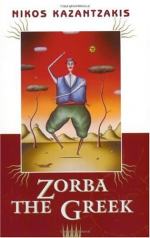|
This section contains 571 words (approx. 2 pages at 400 words per page) |

|
Zorba the Greek Summary & Study Guide Description
Zorba the Greek Summary & Study Guide includes comprehensive information and analysis to help you understand the book. This study guide contains the following sections:
This detailed literature summary also contains Related Titles and a Free Quiz on Zorba the Greek by Nikos Kazantzakis.
Determined to prove that he can live an active life, a bookworm sets out to make his fortune mining coal on Crete. Waiting for his ship to set sail, this narrator sits in a pub and ruminates over memories of a friend who has gone to sea defending Greece from foreign invasion and rescuing countrymen abroad. He and this friend made a pact requiring each to warn the other in case of danger, transmitting a distress signal through their unbreakable bond of friendship. In the pub, the narrator has the unexpected good luck to meet Zorba before setting sail and takes him on as a foreman to oversee the work. The narrator is immediately taken with his new companion and seeks to emulate his passionate, instinctual behavior.
After they arrive in Crete, Zorba and the narrator find refuge with the widow, Madame Hortense, whom Zorba romances to pass the time. Zorba tutors the narrator in how to live in the world and goads him to pursue a widow of his own. Throughout their friendship, Zorba shares stories of his life and expounds his own unique take on God, who Zorba believes is a debaucher like himself. He looks to the narrator for advice on spiritual matters but grows frustrated when his friend cannot provide definitive answers. Zorba reasons that he knows what he knows with all of his being, and what good are books if they cannot offer the same for other men?
Zorba and the narrator encounter their first calamity when a gallery in the mines collapses, and the workers barely escape with their lives. The near-death experience intensifies the narrator's desire for an alluring widow, but in his mind she is still an abstraction, a temptress sent to torment him. Eventually, though, fortified by Zorba's slogans of wine and women, he succeeds in courting the widow. Making love to the widow brings the narrator back into the physical world and lets him finish letting go of abstract thoughts. When the widow is murdered by a vengeful mob, however, angry at her role in a young lover's suicide, the narrator returns to abstraction to cope with her death. Though Zorba's own heartfelt mourning shames him, the narrator begins to accept his own nature and realize that it is possible to integrate the mind and the body.
Despite the trouble at the mines, Zorba has another plan to make them wildly rich: they will build a timber railway from the top of a nearby mountain to the harbor, facilitating a lucrative timber export trade. While Zorba is away buying supplies and cavorting with a younger woman, the narrator is compelled to propose to Madame Hortense on his behalf. Zorba agrees to marry her, but Hortense falls ill and dies before they can perform the wedding. Nevertheless, in agreeing to make her an honest woman, Zorba has given Hortense her heart's greatest desire. The timber railway, however, is a colossal disaster, but by this point the men's friendship is so strong that they are beyond caring about financial ruin.
In the final chapter, the narrator learns that both his seafaring friend and the great Zorba have died. The friend, Stavridaki, dies of pneumonia after his greatest military victory, while Zorba dies howling at the moon; thus, both leave the world in a manner fitting their statures. Zorba leaves the narrator his lyrical santuri, the emblem of his happiness.
Read more from the Study Guide
|
This section contains 571 words (approx. 2 pages at 400 words per page) |

|



